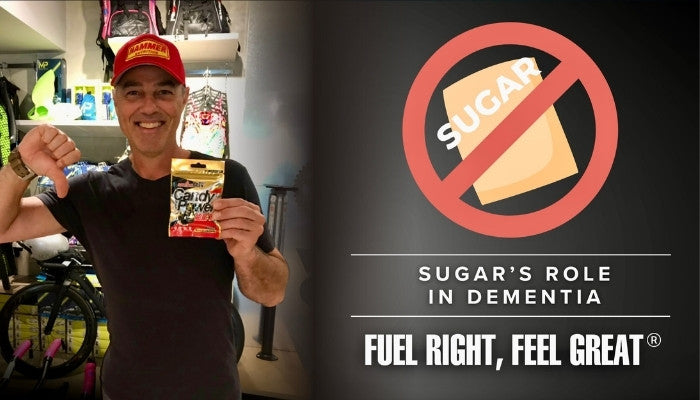
BY STEVE BORN
Prefatory Comments: We first ran a version of this article in Endurance News Weekly, with a rerun in Endurance News #133. So why are we bringing up a subject we've already discussed twice? Because it's crucially important for your health and well-being, simple as that. If you did not read the original article before now, please take a few moments to read this slightly updated version. And once you have, we're convinced that you'll want to take action in avoiding processed seed oils. It's no stretch at all to say that doing so is one of the most important steps you can take to protect your health.
******************************************
In Brian Frank's article, "Four Pillars for Health and Wellness" (Endurance News #134), he most appropriately includes avoiding sugar and limiting sodium as two of the four pillars. We’ve added a fifth pillar, one which earns a rightful place amongst the other four: Eliminate processed seed oils from your diet as much as you possibly can.
While sugar remains the #1 enemy of your health, salt—with processed seed oils now included—are in a virtual tie (or very close to being tied) as the 2nd enemy of your health. Dr. Chris Knobbe's eye-opening video lecture, "Diseases of Civilization: Are Seed Oil Excesses the Unifying Mechanism?" [1] provides more-than-ample evidence that processed seed oils are indeed a primary key to a vast number of chronic diseases that can affect every one of us. Dr. Knobbe boldly states:
"While processed foods are driving virtually all of this chronic disease, of the processed food components… it is the seed oils that are the primary drivers because they are the biological poisons. They are poisons, plain and simple."
These seed oils "now make up 63% of the American diet, form the basis of USDA food recommendations, and are found in 600,000 processed foods sold in the U.S. today," according to Dr. Knobbe. "In 1909, Americans ate 2 grams a day of vegetable oil, says Knobbe, and by 2010 they were eating an astounding 80 grams of vegetable oil a day." [1]
While you ponder the profound immensity of those statements, let's backtrack just a bit…
We need two essential fatty acids (EFA) for life—the omega-6 fatty acids and omega-3 fatty acids. Our bodies cannot make either, so we must obtain these fatty acids from dietary sources. Omega-6s are vital because they produce specific molecules (prostaglandins and leukotrienes) that are, in appropriate amounts, necessary for proper immune system function. Omega-3's also produce prostaglandins and leukotrienes; however, these are different types than omega-6s make. They're less inflammatory and are associated with many health benefits.
While both are necessary for the human diet, the problem is that most people consume an excess of omega-6's, while their omega-3 intake is woefully lacking. While research points to a 3:1 to 4:1 omega-6 to omega-3 as ideal, most people’s diets show a 20:1 ratio or even higher. Dr. Artemis P Simopoulos explains:
"In the past three decades, total fat and saturated fat intake as a percentage of total calories has continuously decreased in Western diets, while the intake of omega-6 fatty acid increased and the omega-3 fatty acid decreased, resulting in a significant increase in the omega-6/omega-3 ratio from 1:1 during evolution to 20:1 today or even higher. A balanced omega-6/omega-3 ratio is vital for health." [2]
Clearly, a 20:1 omega-6 to omega-3 ratio is very much out of balance. This imbalance causes excess inflammation and oxidation throughout the body, significantly disrupting optimal health and increasing the likelihood of chronic diseases, including obesity, diabetes, heart disease, cancer, and more. [2]
The primary culprit for the excess? Health-destroying amounts of omega-6 fatty acids. The increased use and consumption of industrially processed seed oils referred to as vegetable oils. Dr. Chris Knobbe states that these industrially processed seed oils "drive the oxidation. They're pro-oxidative, proinflammatory, and toxic, but of all of these, it is oxidation. That is by far the worst."
Cardiovascular research scientist, Dr. James DiNicolantonio, agrees and refers to these omega-6 seed oils as "drivers of coronary heart disease." He summarizes:
"Omega-6 polyunsaturated fat linoleic acid consumption has dramatically increased in the Western world, primarily vegetable oils. Numerous lines of evidence show that the omega-6 polyunsaturated fat linoleic acid promotes oxidative stress, oxidized LDL [the "bad" cholesterol], chronic low-grade inflammation, and atherosclerosis. Omega-6 is likely a primary dietary culprit for causing CHD (Coronary Heart Disease), especially when consumed as industrial seed oils, commonly referred to as vegetable oils." [3]
What We ALL Need to Do NOW!
To reestablish the proper balance of omega-6 to omega-3 —helping to protect against serious health outcomes and return us to a much healthier state—we need to reduce significantly or eliminate the consumption of the following oils:
- Canola oil
- Corn oil
- Cottonseed oil
- Grapeseed oil
- Peanut oil
- Rice bran oil
- Safflower oil
- Soy oil
- Sunflower oil
It's important to remember that most-to-all of these highly processed seed oils are found not only in oil form but in processed/fast foods, so we also need to strive to eliminate them from our diet. As Dr. Catherine Shanahan states, "More than any other ingredient, vegetable oil is what puts the 'junk' in junk food." [4]
Healthier oil options include:
- Virgin olive oil.
- Avocado oil.
- Flaxseed oil.
- The oils from certain types of fish (e.g., salmon, mackerel, and sardines).
Regarding the latter, while consuming these types of fish two to three times a week is a sage strategy, it's simply impossible for most of us. That's where Hammer Nutrition's EndurOmega comes in. Taking two soft gel capsules two to three times daily is a super-easy way to help "restore the balance" and provide you with numerous benefits for optimizing your health.
Olive Oil – The Healthiest of Them All!
In our article on processed seed oils being a health hazard, we just touched on a couple of quite healthy oils, one of which is olive oil. Some impressive research published in the Journal of the American College of Cardiology [5] clearly indicates olive oil is not just healthy but has some remarkable benefits that may very well extend life.
Using participants from the Nurses' Health Study and the Health Professionals Follow-up Study, researchers analyzed 60,582 women and 31,801 men free of cardiovascular disease and cancer at the baseline study in 1990. During 28 years of follow-up, a questionnaire assessed the diet every four years.
After the 28-year follow-up, researchers compared those who rarely or never consumed olive oil, those in the highest consumption category—consuming more than 7 grams (>1/2 tablespoon) of olive oil had:
- 19% lower risk of cardiovascular mortality
- 17% lower risk of cancer mortality
- 29% lower risk of neurodegenerative mortality
- 18% lower risk of respiratory mortality
The study also found substituting 10 grams/day of other fats, such as margarine, butter, mayonnaise, and dairy fat, with olive oil was associated with an 8-34% lower risk of total and cause-specific mortality. They found no significant associations when substituting olive oil for other vegetable oils.
Lead study author Marta Guasch-Ferré, Ph.D., states, "Our findings support current dietary recommendations to increase the intake of olive oil. Clinicians should be counseling patients to replace certain fats, such as margarine and butter, with olive oil to improve their health."
Summary
We've written about the serious health dangers of processed seed oil consumption, all of which should serve as a call to action. What action should we take? This brief recommendation from Dr. Chris Knobbe says it all: "Replacing dangerous oils with healthy fats can go a long way toward boosting your health and reducing your risk of chronic disease."
REFERENCES:
[1] https://www.youtube.com/watch?v=7kGnfXXIKZM
[2] https://pubmed.ncbi.nlm.nih.gov/26950145/
[3] https://openheart.bmj.com/content/openhrt/5/2/e000898.full.pdf
[4] Deep Nutrition, Why Your Genes Need Traditional Food Flatiron Books; First Edition (January 3, 2017)
[5] https://www.jacc.org/doi/10.1016/j.jacc.2021.10.041










11 comments
Great article, was wondering if sesame oil falls into the seed oil ? A low heat point of 325 ?
———
Hammer Nutrition replied:
I’d put sesame oil in the “good for you” side. Sesame oil contains vitamin E, as well as beneficial phytosterols, lignans, sesamol, and sesaminol, all of which help scavenge free radicals. In addition, sesame oil has a balanced ratio of omega-3, omega-6, and omega-9 fatty acids.
I don’t see Coconut oil or Coconut butter listed with healthier oil options.
I think grass fed organic Butter and Tallow are excellent healthy options as well.
Kenny
———
Hammer Nutrition replied:
The emphasis on this article, and the research discussed in the article, is to avoid the processed seed oils listed. With that in mind, I agree with you on virgin/unrefined coconut oil, which has a smoking point of 350°F – 380°F, making it an ideal choice for baking and lower-heat cooking. Additional benefits of unrefined coconut oil may be found in an article at https://www.healthline.com/nutrition/top-10-evidence-based-health-benefits-of-coconut-oil. Tallow is also considered to be a healthy option. That said, while coconut oil and tallow are considered healthy fats, we believe they still fall slightly lower on the “healthy scale” compared to the fats listed in the article: Virgin olive oil, Avocado oil, Flaxseed oil, the oils from certain types of fish (e.g., salmon, mackerel, and sardines).
Used occasionally, grass-fed organic butter may also be considered a better option than the processed seed oils listed in the article. That said, in the study, the researchers found that “substituting 10 grams/day of other fats, such as margarine, butter, mayonnaise, and dairy fat, with olive oil was associated with an 8-34% lower risk of total and cause-specific mortality. They found no significant associations when substituting olive oil for other vegetable oils.”
I’m deeply disturbed by the fact that in an otherwise excellent article, you equate butter fat with margarine and mayonnaise. The latter are almost invariably made from seed oils(read the labels yourself) whereas butter fat is a completely different type of fat. Butter is also an excellent source of bioavailable vitamin A and CLA, neither of which are in the other two.
———
Hammer Nutrition replied:
We did not equate butter fat with margarine and/or mayonnaise. This was what the study (not us) found. As we state in the article, the researchers for that “substituting 10 grams/day of other fats, such as margarine, butter, mayonnaise, and dairy fat, with olive oil was associated with an 8-34% lower risk of total and cause-specific mortality. They found no significant associations when substituting olive oil for other vegetable oils.” Additionally, the recommendation “to replace certain fats, such as margarine and butter, with olive oil to improve their health" is a quote that comes directly from Dr. Gausch- Ferré, not us. We are simply reporting the findings of the study, from which the individual may make their own decisions regarding the types of oils and other foods you wish to consume.
Where is this article – Four Pillars for Health and Wellness – Endurance News #134? I can’t find it on the site.
———
Hammer Nutrition replied:
You’ll find the article on pages 26-27 at https://cdn.shopify.com/s/files/1/0617/9192/8555/files/ENissue134.pdf
Suggested use on the EnDuroMega bottle is two capsules a day. Half what is mentioned in the article.
———
Hammer Nutrition replied:
The suggested use/dosage on the label of EndurOmega has to be listed as a generic amount, as is necessary per FDA labeling requirements. On the HOW TO USE section on the EndurOmega website page (https://hammernutrition.com/collections/supplements/products/enduromega), the suggested usage is “2–10 capsules daily with meals. For best results, split dosages during the day.”